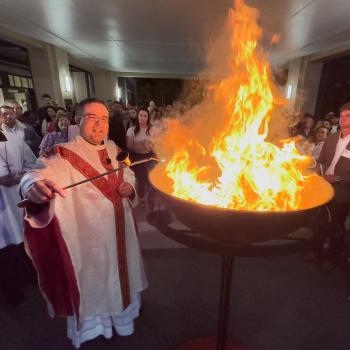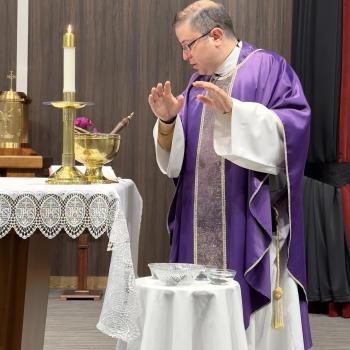Many today have the impression that Jesus was a marginal preacher who only had twelve men and several women following him. No one else listened to his message until it was too late, until they had nailed him to a cross.
Today’s Gospel passage presents a different reality. Jesus commissions seventy-two men to go out in pairs to preach the Gospel. Who are these men? Where did they come from?
These men had been transformed by the message Jesus preached and had even remained willing to follow him after the harsh words of Jesus which we heard last week in the Gospel reading:
“Let the dead bury the dead”
“No one who sets his hand to the plow and looks back is fit for the Kingdom of God.”
These seventy-two men were willing to leave everything behind and to venture into an unknown path trusting only the words and detailed instructions of Jesus.
A priest in ancient Rome named Hippolitus redacted a list with the names of the seventy-two, including among them James the Greater, Luke and Mark the evangelists, Barnabas and Silas the companions of Saint Paul, Stephen the first martyr and Ananias who baptized saint Paul. Among them was also Saint Addai who evangelized Persia and is still remembered today by Christians in the Middle East, especially by Chaldean Christians in Iraq, for having written the prayers of their liturgy.
When considering these men and their willingness to dedicate their entire lives to the preaching of the Gospel, two things came to my mind:
1. Throughout the centuries millions of men have followed the steps of these 72 disciples and gone out to be laborers for the master as priests.
2. When one person gives his or her life to Jesus, Jesus is able to work wonders through them.
Presently there are 410,000 priests in the world serving 1.16 billion Catholics.
The number of priestly ordinations worldwide has increased from 4,600 in 1970 to 6,800 in 2010. The number of seminarians worldwide since 1985 has increased by 15,000 to 58,000 men currently studying to become priests.
In 1970 there were 309 permanent deacons in the whole world, today there are 36,539.
Just as some wrongly believe that Jesus only had twelve men and a few women following him, some believe that today not many people choose to follow Christ in a radical, self-giving way. Yet the facts show that many are willing to be sent to preach the Gospel.
While in seminary I oftentimes thought of my two Syrian friends who were studying for the Armenian Catholic Diocese of Aleppo in Syria. In my thoughts, I would compare what I would return to in the United States and what they would return to in Syria. I always thought of them as heroes because they were returning home knowing well the consequences of preaching the Gospel. One is now a hostage of Syrian rebels. The other bravely continues to work in his parish in Aleppo.
A priest who graduated from my university in Rome a few years before me was a priest in Iraq. He was murdered in 2007 at the doorsteps of his parish in Mosul with his deacons. Father Ragheed Ganni was a Chaldean Catholic priest. My professors and many students remembered him well.
Men, in the thousands. continue to follow the radical call of Jesus Christ, the same call the seventy-two disciples received and answered.
The harvest is abundant but the laborers are few. We must ask the Master to continue to send laborers for his harvest. The impact one laborer can have is as immeasurable as God’s grace.
Think of Blessed Mother Teresa of Calcutta. Born in Albania, she traveled to India as a religious sister to teach at a young girls’ school. She received a call to leave everything behind to serve the poorest among the poor in Calcutta. Her labor has certainly yielded an abundant harvest. Fifteen years after her death, the order she founded has 4500 sisters in 133 countries taking care of those society rejects: the poor, the sick and the dying.
Saint Catherine of Siena wrote, “If you are what you should be, you will set the world on fire.”
Answering God’s invitation to follow him with our whole hearts will set us on fire and we will certainly set the world on fire with the Holy Spirit.
Saint John Vianney was sent to rural and remote village of Ars, France in 1818 because he was not considered very smart. John Vianney ministered during the aftermath of the French Revolution, one of the most difficult periods of history for the Church. Thousands of priests and religious had been executed or had abandoned ministry. Monasteries were suppressed, the Church threatened, cathedrals turned into Temples of Reason, stables or markets, and the faith ceased to be taught in whole regions of France.
Yet by trusting in God’s grace and diligently working in Ars, the little piece of God’s Church entrusted to him, Saint John Vianney helped transform the soul of a whole nation.
This happened because he did what God called him to do. Even though he was in remote Ars, because he did God’s will, God set the world on fire through his faithful discipleship.
What does this all mean for us today?
That we must not be afraid to answer the call and to be sent. God may be calling you some of the young men here the priesthood and some young ladies to religious life. Others he calls to marriage or the single life. Whatever the call, He calls all of us to live out our faith with conviction and with courage, so that through our faithful discipleship God may set the world on fire.
















